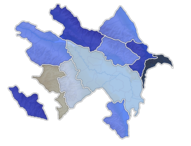This is a list of Azerbaijani regions by Human Development Index as of 2022.[1] This also includes Baku, the capital and largest city, but excludes the Nakhchivan Autonomous Republic and Kalbajar-Lachin.

>0.800
0.750 – 0.800
0.700 – 0.750
0.650 – 0.700
| Rank | Region | HDI (2022) |
|---|---|---|
| Very high human development | ||
| 1 | Baku | 0.830 |
| 2 | Absheron Economic Region (without Baku) | 0.805 |
| High human development | ||
| 3 | Sheki-Zagatala economic-geographical region | 0.766 |
| – | 0.760 | |
| 4 | Guba-Khachmaz Economic Region | 0.738 |
| 5 | Mountainous Shirvan Economic Region | 0.727 |
| 6 | Ganja-Gazakh Economic Region | 0.724 |
| 7 | Lankaran Economic Region | 0.718 |
| 8 | Aran Economic Region | 0.712 |
| 9-10 | Karabakh Economic Region | 0.706 |
| 9-10 | East Zangezur Economic Region | 0.706 |
| – | Nakhchivan Autonomous Republic | No data |
Nakhchivan Autonomous Republic
editNakhchivan enjoys a high Human Development Index; its socio-economic prowess far exceeds that of Azerbaijan itself. According to the report of Nakhchivan AR Committee of Statistics on June 30, 2018 for the end of 2017, some socio-economical data, including the following, are unveiled:
| Variable | Value |
|---|---|
| Population | 462,055[2] |
| GNI (PPP) per capita | $15,240[3] |
| Life Expectancy at birth | 72.9 years[4] |
| Mean Years of Schooling | 10.5 years[5] |
| Expected Years of Schooling | 12.6 years[5] |
Making use of the Human Development Index calculation method according to the new UNHD 2014 method,[6] the above values change into an HDI of 0.756.
References
edit- ^ "Sub-national HDI - Area Database - Global Data Lab". hdi.globaldatalab.org.
- ^ "Naxçıvan əhalisinin sayı açıqlandı". 22 May 2018. Retrieved 23 January 2018 – via qafqazinfo.az.
- ^ "Makroiqtisadi göstəricilər". statistika.nmr.az. Retrieved 2014-12-05.
- ^ "Naxçıvan Muxtar Respublikası üzrə cins bölgüsündə doğulanda gözlənilən ömür uzunluğu". Retrieved 2014-12-05.
- ^ a b "Naxçıvan Muxtar Respublikası üzrə təhsilin əsas göstəriciləri". Retrieved 2014-12-05.
- ^ "Technical notes: Calculating the human development indices – graphical presentation" (PDF). 24 June 2014. Retrieved 2014-12-05.